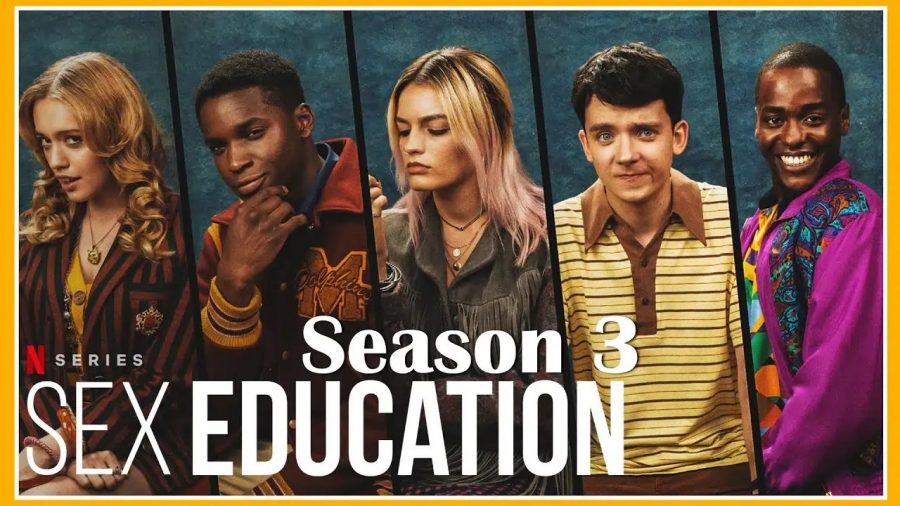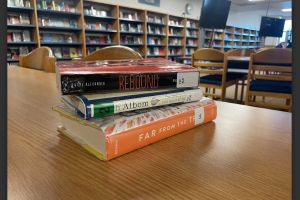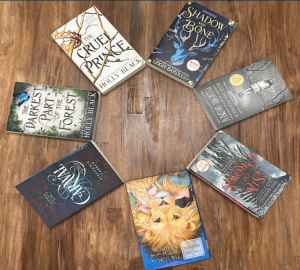Netflix’s “Sex Education” returns for an anti-climactic third season
Promotional poster for season 3 of Netflix’s Sex Education.
September 28, 2021
In recent years there has been a noticeable, but not unwelcome, shift regarding social topics like race, sexuality, and gender. We seem to be striving towards an era of tolerance and acceptance, and our media is beginning to reflect that change in mindset. Netflix’s original series, Sex Education, is a teen comedy that tackles topics like these with thoughtfulness, dignity, and plenty of British wittiness.
The students of Moordale Academy returned for their third season on Sept. 17, and like many fans of the show, I was incredibly excited. The first season has had a place in my heart since its original release date, and the second served as a satisfying continuation. So, understandably, I went into season 3 with anticipation and delight.
But by the end of my binge, I honestly felt somewhat disappointed. And the worse part? I couldn’t even fully understand why.
There is plenty to praise about this season. Sex Education has always had a stylistic element to its cinematography and costume design, taking subtle inspiration from the ’80s and ’90s. While watching the newest episodes, I could tell that there was further improvement. Many of the shots were beautiful, even breathtaking, whilst using color, lighting, and object placement to their advantage. Each scene felt rich and alive, especially when it came to portraying the characters and their emotions. It is clear how much thought went behind each and every shot.
Additionally, the show’s characters and relationships continued to grow and overcome new challenges. The two main protagonists, Otis Milburn (Asa Butterfield) and Maeve Wiley (Emma Mackey), each went through very positive character development.
After watching Otis struggle with his self-worth the previous two seasons, seeing him gain confidence and start standing up for himself was incredibly satisfying to watch. On the other hand, we saw a more genuine side of Maeve this season as she overcame her own insecurities through friendships both new and old. Following Maeve’s crushing final scene in season 2, it was great to see her finally have some wins.
This growth was not limited only to the protagonists though. The introduction of new characters succeeded in both freshening the storyline and challenging the other characters. Hope Haddon (Jemima Kirke), the newly appointed Headmistress, serves as a great antagonist with believable motives and surprising depth. Meanwhile, Cal Bowman (Dua Saleh), a new student at Moordale Academy, challenges the rigid rules Hope instills and forms unlikely friendships in the process.
I was also pleasantly surprised by a few of the recurring characters, such as Ruby Matthews (Mimi Keene). After watching her as the stereotypical popular girl for two seasons, we are finally given insight into Ruby’s life and even watch her fall in love. I ended up liking her much more than I thought possible.
So why, in spite of all these positives, do I still feel unsatisfied with Sex Education’s third season? Well, in general, it felt repetitive and indecisive, particularly when it came to the second half. There were many times where I felt like I was re-watching a scene from previous seasons, just in a slightly different format.
For instance, Otis and Maeve’s potential relationship has been teased since season 1, following a classic “will-they-won’t-they” plotline. At first, I was rooting for them, but the show keeps bringing them together and breaking them apart again so often, that now I am left wondering why I even cared in the first place. As soon as there is even the slightest misunderstanding, Otis and Maeve are no longer on speaking terms, again, yet the audience is still meant to believe that they’re soulmates, even when they are happily dating other characters who treat them with respect.
The only reason we even have to believe that Otis and Maeve should be together is the fact that other characters keep bringing it up out loud, as if to say to the audience, “See, we all want them to date, so you should too!” And this method of telling the audience rather than showing is incredibly lazy writing.
Many of the relationships unexpectedly fell victim to this same format. Several of the main plot points were centered around couples fighting over basic miscommunication, and when you’re watching couples argue in almost every scene, back-to-back, for eight episodes, it becomes exhausting to watch.
Additionally, some developing character and relationship arcs came to a sudden halt in this season. Ruby’s arc remained incomplete and was straight-up forgotten in the middle of the season. Then one of the show’s major couples, which had been building up since season 1, broke up for a reason completely out of their characters. It felt obvious while watching that the writers were prioritizing certain plot points at the expense of others.
I think the message Sex Education tried to convey this season was that, we all face challenges in our relationships and must learn to overcome them together. An interesting premise to be sure, but in execution, the show relied too heavily upon repetitive romances. There were other angles that they took, such as complications between friends and family, but those storylines were either wrapped up too quickly or not given proper attention.
With all the hype that Netflix gave season three, it is unfortunate to see how anti-climactic it truly was. Ironically, for a show that prides itself on originality, the writers seem to have trouble breaking out of their own old habits, and it shows.
Overall, Sex Education is still a great show, and its ensemble of unforgettable characters makes it reminiscent of shows like Skins. I would still recommend it to anyone who is willing to give it a chance, as it remains clever and enjoyable. I do not believe that the third season defines the series as a whole, even though it does make me worried for future episodes. I can only hope that the writers are able to expand outside of what they are comfortable with, and be open to new plotlines in the upcoming seasons.
5/10








